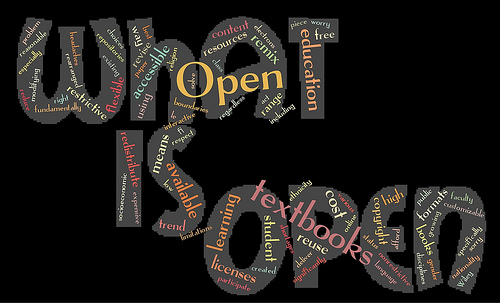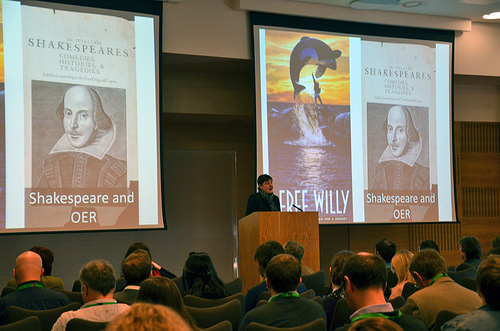This year I attended the 7th Open Educational Resources Conference. ‘OER16: Open Culture’ held on 19th-20th April 2016 at the University of Edinburgh. For the uninitiated, ‘Open educational resources (OER) are freely accessible, openly licensed documents and media that are useful for teaching, learning, and assessing as well as for research purposes’ (Wikipedia). OER16 saw the annual coming together of the openness movement.

flickr photo by fastfonz https://flickr.com/photos/asintjago/5549078477 shared under a Creative Commons (BY) license
In preparation, I’d participated in the Take 5 Open course during Open Education week. Part of the course involves sharing your thoughts and opinions on a Padlet wall. This was a big deal for me. I’m used to sharing my thoughts and observations online in my personal domain but not so in a professional capacity. Readily sharing information about nights out, food I’ve consumed and sleep quality but nothing of any real depth. With the theme of Open Culture for OER16 I was hoping to gain a greater understanding from an institutional perspective but was pleasantly surprised to also gain some personal insight.
What are we demanding of ourselves and others when we ask for Openness?
Several contributors noted that there are many definitions of ‘open’. Catherine Cronin reminded listeners to her keynote (“If ‘open’ is the answer, what is the question?”) that openness is personal and that we are all negotiating risk every time we consider sharing. That being open is about not concealing one’s thoughts or feelings. As Catherine explained, we split the decisions we make with every share as follows:
- Macro – will I share / blog/ tweet..?
- Meso – who will I share with?
- Micro – who will I share as?
- Nano – will I share this?
Once we’ve navigated through our personal risks there’s also the legal side, concerned with the copyright (see this YouTube video on Creative Commons Licensing). We may also need to take into consideration the policy, culture and values of the institutions we are associated with. Without the ability to neatly calculate the tangible risk we’re left to ‘suck it and see’, leading many to go it alone. The idea of ‘Act now ask for forgiveness later’ came up time and again. In a sense that’s where open works best. A driver for creation or sharing may start small, it’s only once you share without barriers that the true impact can be realised.
Dr Emma Smith, in her session ‘Free Willy: Shakespeare and OER’ talked about starting to share her lectures as podcasts in 2009. This began as a way of sharing the content with those unable to attend in a more local sense but has since gathered momentum. Emma’s expertise matched with her accessible style have made her podcasts massively popular reaching a truly global audience with her lectures available both on iTunes and through Oxford’s own domain. There’s no post production editing, Emma shares her true lecturing self. *warning it’s compelling listening and I’m addicted!

flickr photo by ac.page https://flickr.com/photos/acpage/26549139765 shared under a Creative Commons (BY-SA) license
Ollie Jones’ experience as a medical student at Leicester University led him to build an online textbook simply because one didn’t exist.
Ollie collaborated with a network of fellow students and has developed a rating and comments system which has created a feedback loop to constantly improve quality and accuracy. Emma’s brave and bold personal decision has benefited those able to access her teachings and Emma herself by enabling a wider connection and discussion of her work. Both examples show that despite producing a digital output these are not remote, impersonal relationships.
Emma and Ollie both have impressive user statistics for their resources and although gathering such data is useful the numbers cannot capture the learning in the room during the creation and curating of a resource. It was great to see and hear how much of the real innovation within the OER community seems to be happening face to face.
Editing Wikipedia
I was introduced to the concept of an Editathon, a session with Librarians, tech staff and academics working together to improve on or produce open resources on Wikipedia. This isn’t a committee or focus group, no one needs to own an action outside of the immediate activity. It’s a unique opportunity to pull people together to share an experience who might not ordinarily work together. Sharing thoughts, participating, contributing, to create a resource on an existing open platform. Edinburgh University have employed their very own Wikimedian in Residence , Ewan McAndrew. They are invested in improving and expanding the information available through Wikipedia. I attended Wikipedia training and along with Fiona Courage, the Special Collections & Mass Observation Librarian of the Keep,already have plans to set up our own Editathons at Sussex.
OER16 was more than I could have hoped for. The keynotes, presentations and workshops were really engaging and interesting. At the breaks and over dinner the delegates of OER16 proved themselves to be worthy ambassadors of open. I felt that every individual contribution mattered, believing in this can be the one gateway to true openness. So here I am sharing my thoughts that OERs are important and that the personal benefits far outweigh the risks.



Hi Nicole – many thanks for this summary of ‘your’ OER16 (conference experiences are personal too 😉 ) and the comments on my keynote. I thoroughly enjoyed the conference — the sessions I attended as well as the many conversations over the course of the 2+ days. I feel a collective sense of ‘moving on’ in the open education community, a willingness to tackle some of the more challenging question about risk, power and inequality. Though there is much work to do, this move towards more critical analysis is heartening.
Many thanks again and glad to be connected 🙂